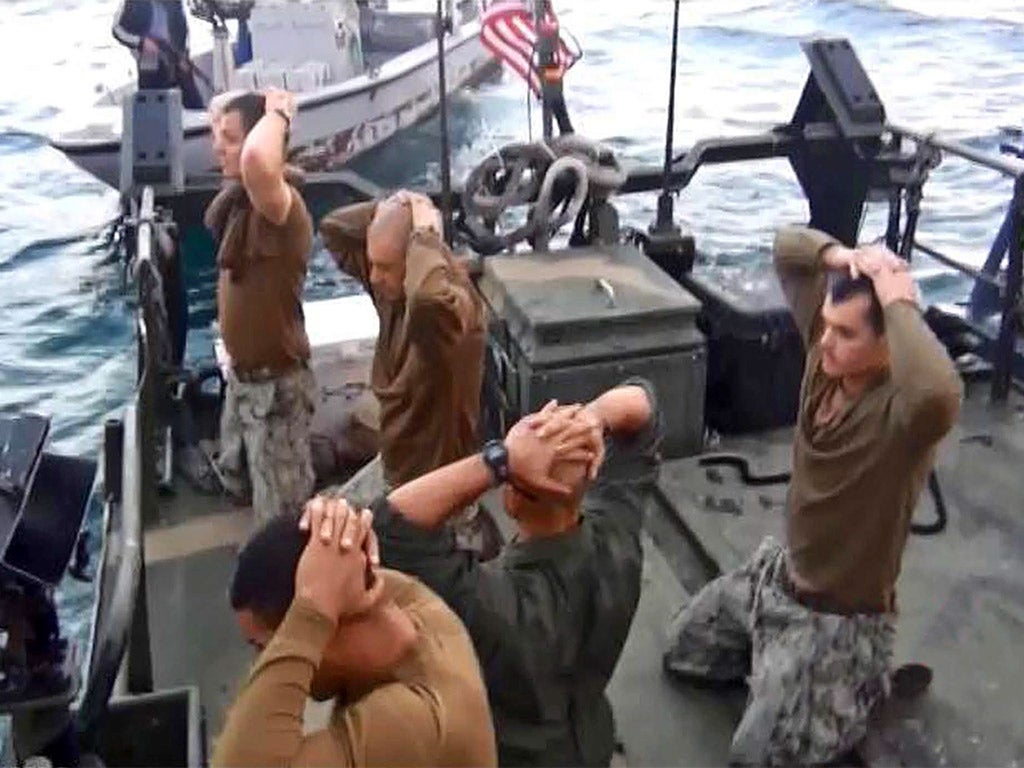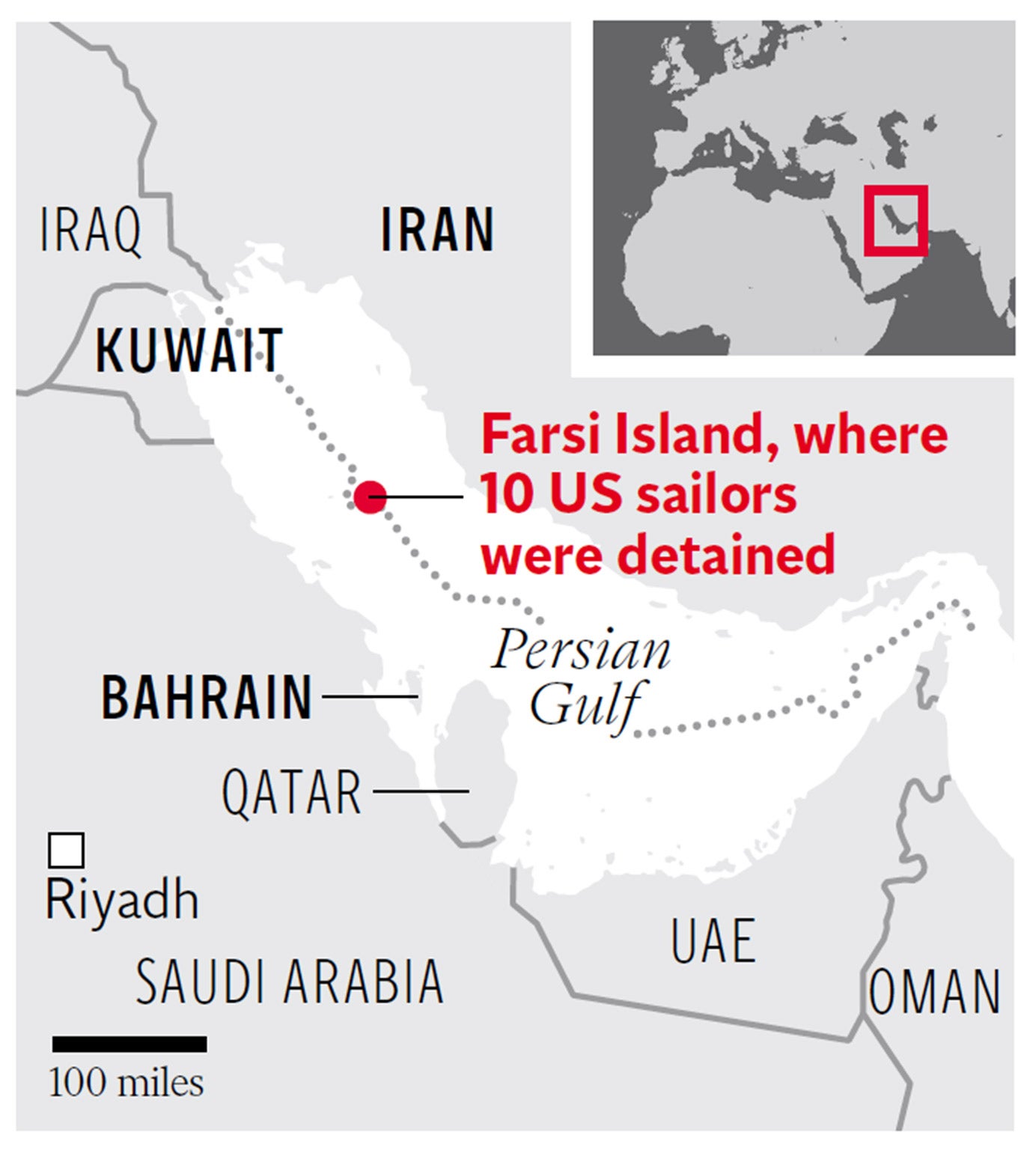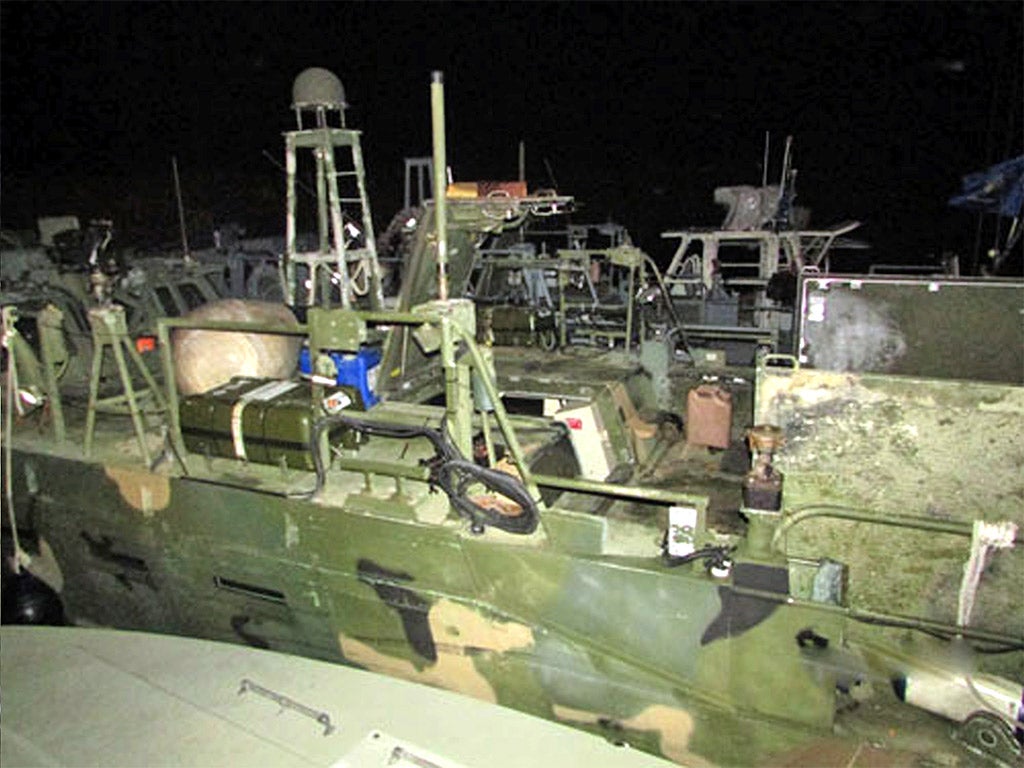Iran releases 10 US sailors detained in Persian Gulf - and avoids a diplomatic disaster
In the past, the stand-off may have escalated into a far worse situation. But relations between the countries are very different now...

Your support helps us to tell the story
From reproductive rights to climate change to Big Tech, The Independent is on the ground when the story is developing. Whether it's investigating the financials of Elon Musk's pro-Trump PAC or producing our latest documentary, 'The A Word', which shines a light on the American women fighting for reproductive rights, we know how important it is to parse out the facts from the messaging.
At such a critical moment in US history, we need reporters on the ground. Your donation allows us to keep sending journalists to speak to both sides of the story.
The Independent is trusted by Americans across the entire political spectrum. And unlike many other quality news outlets, we choose not to lock Americans out of our reporting and analysis with paywalls. We believe quality journalism should be available to everyone, paid for by those who can afford it.
Your support makes all the difference.By averting a diplomatic disaster and releasing 10 sailors seized in the Persian Gulf, Iran appeared to have saved the landmark nuclear deal with America. In return, economic sanctions will be lifted within days.
As soon as Thursday, or over the weekend, the sanctions on Iranian exports – particularly oil – are due to be stopped when international inspectors confirm that nuclear restrictions imposed by Washington have been met. Among them, at the Iranian nuclear reactor in Arak, south of Tehran, the calandria, or central vessel, has now been removed and the reactor filled with concrete, John Kerry, the US Secretary of State, has announced.
Newly opened diplomatic channels between Washington and Tehran, established during the final stretches of negotiating the nuclear agreement in the first half of last year, seem to have quickly ended the crisis and spared the sailors – nine men and nine women – a lengthier and more dangerous encounter.
After the two small boats, each under 20ft, were boarded on Tuesday afternoon and the Americans were taken into custody, Iran waited less than 24 hours to release them, issuing a statement accepting that if there had been an incursion of their territorial waters, it had been accidental. US officials said that one of the two boats may have had mechanical problems and drifted and the second had gone to its aid.
Iranian television released images of the tense moments when the two boats were boarded and the Americans were forced at gunpoint to kneel on deck with their hands on their heads. Shortly after being allowed to return to sea in their original vessels, the Americans were picked up by a US vessel and later airlifted to Qatar where they were being debriefed and given medical checks.

“There are always situations, as everyone knows, which have an ability if not properly guided to get out of control,” Mr Kerry said. “We can all imagine how a similar situation might have played out three or four years ago.” Officials said Mr Kerry had called his Iranian counterpart, Mohammad Javad Zarif, immediately upon hearing of the incident. They had at least four subsequent conversations. “If we are able to do this in the right way, we can make this into what will be a good story for both of us,” Mr Kerry was said to have told Mr Zarif.
The Iranian Revolutionary Guard said an apology had been issued by Washington. That was flatly denied.
The events were in stark contrast to 2007, when Iran detained 15 British sailors and marines, also in the Gulf while they were searching for a missing merchant ship. They were held for 13 days in conditions described later as deplorable. The Britons said they were blindfolded, had been coerced into confessing they had intruded into Iranian waters and feared throughout they would be executed.

This time Tehran had a clear incentive to avoid a prolonged stand-off. The country is just days away from satisfying the first conditions of the 2015 nuclear deal, which will release billions of dollars in assets and restore its access to oil markets.
Yet if there was nervousness in Washington it was because it remains no secret that the conservative foes of the more moderate Iranian President, Hassan Rouhani, including many in the top ranks of the Republican Guard, remain suspicious of the nuclear deal and might have relished a crisis to derail it.
Equally in the United States, conservatives in the Republican Party have kept up their criticism of the pact which they believe is insufficiently rigorous to achieve its prime objective of stopping Iran from building its own atomic weapon. That the incident was reported just as Mr Obama was preparing to head to Capitol Hill to deliver his eighth and final State of the Union address added to the stakes on Tuesday night. The speech mentioned the nuclear deal with Iran as evidence of the power of diplomacy.
No sooner had Mr Obama finished than Republicans, including Senator John McCain, were lamenting his failure to mention the captured personnel. “Ten American sailors have been taken into custody in Iran. But President Obama completely omitted this latest example of Iran’s provocative behaviour so as not to interfere with his delusional talking points about his dangerous nuclear deal,” Mr McCain said.
Tensions with Iran in the Gulf had already been rising. At the weekend the Pentagon released video of what it said was a Guard vessel launching rockets in close proximity to an American aircraft carrier on 26 December with almost no warning. At first on Tuesday, the rhetoric from Iran had seemed alarming, with the Guard issuing a statement saying the US vessels had been caught “snooping” in Iranian territory.
But by the time of the release Rear Admiral Ali Fadavi indicated that he accepted that any intrusion had been unintentional. “Our investigations showed the two US Navy boats entered Iranian territorial waters inadvertently,” the Revolutionary Guard said in a statement on state television. “They were released after they apologised.” That, at least, remained disputed. “There’s nothing to apologise for,” Vice President Joe Biden said on breakfast TV in America.
Subscribe to Independent Premium to bookmark this article
Want to bookmark your favourite articles and stories to read or reference later? Start your Independent Premium subscription today.
Join our commenting forum
Join thought-provoking conversations, follow other Independent readers and see their replies
Comments